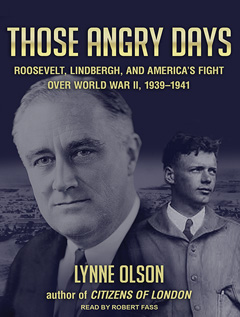 For my summer reading this year, I chose Those Angry Days by Lynne Olson. Those Angry Days covers the period of 1939-1941 and details the bitter conversation and discussion over whether or not the United States should enter the Second World War. President Roosevelt realized the danger to Great Britain and the world from Nazi Germany. But our aviator hero Charles Lindbergh thought we should not be involved in the war, and although he was not pro-Nazi, he was certainly friendly and familiar with the Germans.
For my summer reading this year, I chose Those Angry Days by Lynne Olson. Those Angry Days covers the period of 1939-1941 and details the bitter conversation and discussion over whether or not the United States should enter the Second World War. President Roosevelt realized the danger to Great Britain and the world from Nazi Germany. But our aviator hero Charles Lindbergh thought we should not be involved in the war, and although he was not pro-Nazi, he was certainly friendly and familiar with the Germans.
Roosevelt was a terrific leader. The author points out that most Americans would follow his direction no matter what. Of course, not all did. He gave great speeches of support for Great Britain, but was very slow to act and prepare the nation for the confrontation that was sure to come. America had a large group of 40 destroyers from World War I that were resting in various naval bases around the country. Britain badly needed these war ships to escort their convoys in the North Atlantic, as most of their food and supplies came by ship from the western world.
In early 1940, Churchill notified Roosevelt that Britain entered the war with 176 destroyers, but in less than a year German U-boats and surface raiders had reduced the number to 68. In my opinion, Roosevelt should have acted immediately to lend America's 40 destroyers to Britain, but he decided he would negotiate with Great Britain to procure American naval bases in British possessions in the Atlantic. So, it took several months before the destroyers arrived in the U.K. -- almost too late to help.
Roosevelt wanted to be sure the American people, especially the isolationists, viewed him as a good horse trader. So he worked long and hard at setting up these bases. In 1940 and 1941, Roosevelt gave several inspiring and supportive speeches about the need to stand up against Nazi Germany, but he refused to approve a plan to arm the United States to go to war. Finally in late 1941, just before Pearl Harbor, the U.S. Air Force had only two bomber groups and three fighter groups, hardly enough to take on Germany's thousands of airplanes. It was a Japanese attack on Pearl Harbor that pulled the country together in an all-out effort to take on Japan and Nazi Germany. Overnight there were young men, lined up at the recruiting offices, anxious to go to war and protect their country. Aircraft tanks and arms production ramped up almost overnight.
As we think about it, had this occurred a year earlier, it may have shortened the war by as much as a year. Of course, what would have happened if Japan had not attacked Pearl Harbor and if Germany had pulled back from Russia and successfully defeated Great Britain? Germany supposedly had plans to bring troops from West Africa to South America for an invasion of an unarmed United States.
The book gives great insight into the debate about the U.S.A. entering World War II, and a surprising revelation about Roosevelt's reluctance to prepare the country to enter the war, although it seemed inevitable that she eventually would do so. Those Angry Days is a great read with good history and political intrigue. It opened up a whole new outlook on the debate that went on prior to entering the Second World War.
What books have you enjoyed reading this summer? (I hope someone mentions Without Reservations.)
I'm Bill Marriott and thanks for helping me keep Marriott on the Move.